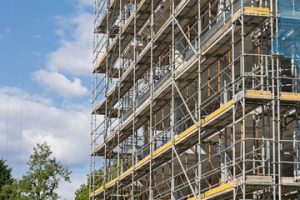Commercial construction projects are much more complex than residential ones. They require a team of specialists, including framers, drywallers, electricians, and plumbers.
If you are considering working with a full-service commercial contractor, there are several questions you should ask to assess their expertise and reliability. Read on to Discover More about some of them:

Communication
Full-service contractors provide a one-stop shop for all construction services, eliminating the need to coordinate multiple vendors. This integrated approach reduces stress and provides a single point of accountability for project success. They handle the entire build, including design and planning, construction, furnishings, and ongoing maintenance. Many businesses benefit from this model, especially those with complex requirements that require expertise in a variety of areas.
One of the most common causes of construction delays is miscommunication. It costs the industry millions of dollars each year to fix problems that could have been avoided with effective communication. Full-service commercial contractors improve communications by ensuring that the right information is delivered to the right people at the right time. They also help prevent misunderstandings by developing clear and standardized communication protocols.
When interviewing potential commercial contractors, ask about their communication protocol and methods. Find out how often they will provide project updates and in what format. Also, ask about their ability to communicate with different types of stakeholders. For example, some projects may involve workers with language barriers, and the contractor should be able to offer solutions that address these issues. These can include providing language classes or pairing workers with bilingual colleagues who can interpret and translate instructions. They also review communication practices regularly to identify and prevent misunderstandings and ensure that all team members are on the same page.
Experience
Full-service construction firms often include design services, project planning, budgeting, scheduling, phasing, bid packaging, subcontractor pre-qualification and selection, land acquisition assistance, and risk management. When vetting these companies, it’s important to compare apples to apples and understand exactly what they are offering.
They also know the complexities of commercial building codes and regulations, ensuring that your project follows all legal requirements. In addition, they are more likely to have established relationships with suppliers and subcontractors that specialize in commercial needs. This can help them streamline the process and reduce costs.
Another benefit of working with a full-service contractor is that they can keep projects on schedule by managing multiple contractors. This is crucial for meeting deadlines and avoiding costly delays. They can also double-check the work of subcontractors to ensure quality standards are met.
Finally, they can offer a single point of contact for all construction-related issues. This allows them to communicate quickly and efficiently with all parties, eliminating confusion and misunderstandings.
It is also a good idea to ask potential builders about their previous projects and whether they have any referrals you can call. This will give you an idea of how well they work with clients and how communicative they are throughout the build. It will also allow you to see how they have handled any challenges or roadblocks in the past and if their solutions were effective.
Licenses
Whether you’re hiring for residential, commercial, or specialty construction projects, it’s important to find a contractor that is licensed. Licensing requirements vary by jurisdiction but often include educational and work experience, passing an exam that covers trade knowledge and business practices, obtaining insurance, and, in some cases, demonstrating financial stability.
It’s also important to note that some types of contractors have licensing requirements that are specific to their profession, such as architectural firms and design professionals who may need a license before they can provide services. Lastly, it’s crucial to ask for references and check online reviews for any projects completed by the contractor you are considering. Look for projects that are similar to yours and ensure that the project results are recent, as this is the best way to determine how a company performs.
Full-service commercial contractors can handle the entire scope of a construction project, bringing in subcontractors like architects, interior designers, electricians, plumbers, painters, and building crews to get the job done. They’ll know how to find the right team of reliable professionals for your unique needs and can help you stay within budget. They will also be familiar with any local laws and regulations that might apply to your project. For example, a state requires all contractors to be licensed to work on construction projects that require permits or have employees. Operating unlicensed in this state can result in fines and loss of vital legal protections like mechanic’s lien rights.
Insurance
In construction, insurance is vital for a number of reasons. It safeguards your business against unforeseen events that could derail your operations and put your financial stability at risk. It also builds trust with your clients and demonstrates that you are prepared to handle the risks of working together, which can be a crucial factor in building long-term relationships.
Understanding the various types of insurance available can help you build a comprehensive safety net for your business. There are three general tiers of coverage that you should keep in mind when choosing which policies to acquire:
Tier 1: The Essentials
This tier includes commercial general liability insurance, workers’ compensation insurance, and commercial auto insurance. General liability insurance is a must for contractors as it protects against claims related to damage to third-party property caused by your business operations. It can also protect you against claims from accidents that occur on your premises or damages to leased equipment.
Workers’ compensation insurance is a must for contractors because it covers the cost of medical bills and lost wages for employees who are injured at work. Additionally, this policy can cover funeral costs and death benefits in the event of an employee’s fatality on the job.